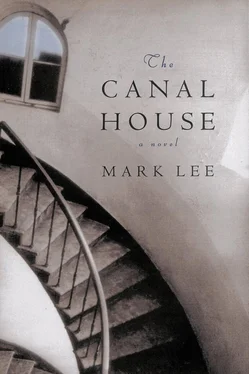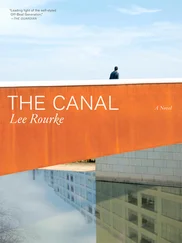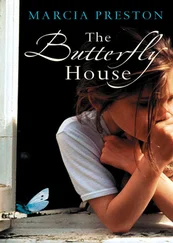“I’m the last person in the world to give advice about relationships.” Nicky walked over to the next glass case and stared at a mummy. “You know, most people think that the Egyptians fished out a mummy’s brains with a little silver hook, but that’s not true. They forced a tube up the nose, broke through the brain case, and everything dribbled out like custard.”
“Go on, Nicky. You were about to say something.”
He turned and looked at me again. “So what happens when this woman comes back from California?”
“I don’t really know. It will take some adjustments, but we can figure it out.”
“Sounds good.” Nicky bowed and gestured like a guide. “Now if you’d walk downstairs, Doctor, I’ll show you the Shabaka Stone.”
DANIEL BEGAN TO glance at the headlines of the newspapers on Church Street. Reading just a few words, he could figure out most of the entire story. As the situation deteriorated in Kosovo, he lingered in front of the racks, reading the lead sentence and then the first paragraph. On Valentine’s day, I gave him a box stuffed with newspapers and magazines from five different countries. “Go ahead and read them,” I said. “You’re starting to annoy that poor woman at the stand.”
He read everything in the box, then began to monitor different conflicts around the world. Daniel drank too much wine one night and told me about covering the war in Bosnia with a Polish photographer, Victor Zikowski. Their car hit a land mine as they were driving through the countryside and Victor bled to death while Daniel pressed a folded T-shirt over the wound.
“I was covered with Victor’s blood,” he said. “When I got back to Sarajevo, I dug a hole and buried my clothes.”
He fingered his wineglass. “The one thing I didn’t know when I was younger was that terrible images stay with you. They never really go away.”
Daniel went out for a walk the next morning and didn’t come back until sunset. We didn’t talk about Victor again.
As spring approached, the swans broke the canal ice that formed overnight and swam about in their little patch of water. Daniel and I began to leave the house separately to walk through London. I liked to take the canal path to the bridge at Primrose Hill into Regent’s Park. I’d pass mothers with old-fashioned baby carriages and businesswomen with leather attaché cases and practical shoes, walking quickly to their responsibilities. I’d always had a strong idea of who I was and where I was going, but now I found myself looking at other women and wondering about their lives.
A boating lake was in one corner of the park with a little island at the center. Gray herons were building nests in the island trees and I spent hours watching them. The herons were large, ungainly birds with white chest feathers. I watched them eat fish and fly around the park with their heads pulled back. Their nests were elaborate constructions of sticks and mud that looked flimsy and vaguely artificial, like something on an opera stage, but the birds fussed over them constantly and guarded their eggs.
I wanted to see the eggs hatch and watch the young birds learn to fly, but that meant I’d have to remain in London. I wasn’t so different from Daniel. We had both been drawn to a life of constant movement, the feeling that every minute was crucial to some larger goal. I was seeing the world—at least, that’s what I told my friends—but now I wondered if I was seeing anything at all. If you settled down and stayed in one place, you became aware of the subtleties, the smaller changes around you and the changes in your own life. It was like stopping in front of a painting in a museum, stepping closer and studying the brushwork there.
In the news, the Serbs refused to sign the peace agreement and militia troops in Kosovo started to force the Albanians out of their villages. When NATO started its bombing campaign, Nicky dropped by to say he was off to Macedonia to photograph the refugees crossing the border. I was downstairs, reading on the bed, but the door was open and I could hear Nicky and Daniel talking in the kitchen.
“You should pay me to take your messages,” Nicky said. “The Washington Post and the Telegraph keep calling me to ask about your health.”
“And what do you tell them?”
“I said that you had some kind of injury from the plane crash. You’re under a physician’s care and you’re getting better.”
“I hope you didn’t tell them that Julia was the physician.”
“So, is it true? Are you getting better?”
“I guess so.” Daniel paused. “After the plane crash, I thought I was going to change my life and do something different.”
“You’ve already given away most of your money, Daniel. What else are you supposed to do?”
“I’m trying to come up with an answer.” The floor creaked; water flowed through the pipes as Daniel filled the kettle. “Haven’t been too successful.”
“Maybe you survived so you could be happy with Julia.”
“Yes. That’s possible, too.” His voice sounded slightly uncertain. “I don’t know, Nicky. We’re just living here. Not worrying about anything. It can’t last forever.”
Nicky left the next day. Daniel began listening to news broadcasts on the radio and I used Amy’s computer to e-mail people I knew in different relief organizations. I learned that Richard had hired a temporary director for Hand-to-Hand. They’d flown to Skopje, Macedonia, and set up a refugee camp at the airport. The camp was disorganized and undersupplied; there were too many refugees and not enough food. In April, a negative article ran in the London Times about Hand-to-Hand. Typhoid had broken out in the camp because of poor sanitation, and several of the refugees had died. The article described Richard as a “billionaire playboy” and said that he’d refused to give an interview. Two weeks later, Hand-to-Hand pulled out of the country and the camp was taken over by the United Nations. I found myself wondering what would have happened if I had been there to run the operation.
On the island in Regent’s Park, the heron eggs began to hatch, and the little birds appeared with dark feathers and small crests. I was watching one afternoon when a fledgling stepped out of the nest and was able to flutter safely to the ground. I bought a bouquet of purple irises to celebrate, even though we were trying to cut back on our spending. When I got back to the house, Daniel was in the living room, waiting for me to come through the door.
“Amy called from California. She’s argued with her boyfriend about the NATO bombing. Now she thinks he’s a fascist and she’s flying home.”
“How soon?”
“Two days. She’s in Los Angeles, staying with some friends.”
I walked up to him and we kissed as if to confirm that we were still together.
“We’ll go down to Bracciano,” he said. “It’ll work out. I promise.”
“Don’t promise.”
“I assume—”
“Don’t assume.”
“I hope.”
And there was no answer to that, because I hoped, too.
• • •
WE TRAVELED DOWN to Rome on the train, picked up Daniel’s car at the convent, and drove north to Bracciano. The air was warm and the trees along the road showed a green haze of new leaves. Mustard grew in the road ditches and a mass of white morning glories clung to a strand of barbed wire. We passed through a village. Daniel made a hard left onto what looked like a cow path, and we bumped down a dirt driveway past a line of cypress trees. The farmhouse was small, but there was a terraced garden and a grove of olive trees with little gray-green blossoms on the tips of the branches.
Daniel parked on a patch of gravel and a tiny woman in a black dress walked down from the garden. I had already been told about La Signora. I knew a little Italian and had studied a phrase book on the train. “ Buon giorno ,” I said, but she ignored me and began talking to Daniel. It was as if she had spent the last few months composing a very long speech about the farm. As she pointed and explained, we took a tour of the olive grove and the irrigated garden. One of the wells had gone dry and an army of snails had attacked the lettuce. The carrots were sick, but the parsley was triumphant. If something was in good shape, Daniel would say: “ Va benissimo .” If there was a problem with weeds, he’d look sad and murmur, “ Sono spiacente .” I’m sorry.
Читать дальше












